How to use the for loop statement in JavaScript
The loop statements in How to use the for loop statement in How to use the for loop statement in How to use the for loop statement in JavaScript include for loop statements and while loop statements. The following article will first introduce to you the usage of for loop statements in How to use the for loop statement in How to use the for loop statement in How to use the for loop statement in JavaScript.
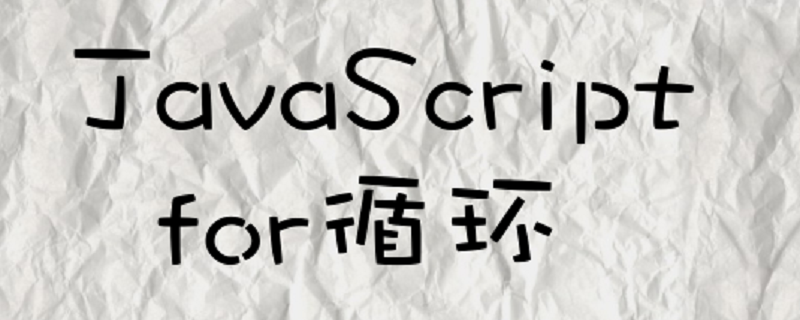
Let’s take a brief look at the difference between for loop statement and while loop statement
Simply speaking, for loop statement and The main difference between the while loop statement is that when the number of loops is fixed, a for loop is used; when the number of loops is not fixed, a while loop is used.
Let’s take a look at How to use the for loop statement in How to use the for loop statement in How to use the for loop statement in How to use the for loop statement in JavaScript
The syntax of the for loop statement
for(初始值;条件表达式;增加/减少表达式){
循环处理
} Let’s look at a specific example of for loop statement
The code is as follows: The variable is specified as i
<!DOCTYPE html>
<html>
<head>
<meta charset="utf-8">
<title>How to use the for loop statement in How to use the for loop statement in How to use the for loop statement in JavaScript</title>
</head>
<body>
<script>
for (var i = 0; i < 10; i++) {
document.write (i);
}
</script>
</body>
</html>First, although it is initial value, but we declare a variable named i and assign it the value 0. This is the initial loop process.
Next, i <10 in the conditional expression means that processing is performed while the value of i is less than 10.
The last increase/decrease expression i means that the value of i is increased by 1 each time it is executed.
Then, specify the loop process to be performed when processing the document using document.write.
When outputting with a browser... Output values from 0 to 9.
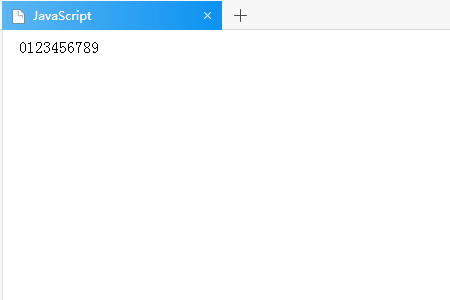
Using for loops in arrays
The syntax of the for statement is often used when writing programs using arrays.
Let’s give an example.
An array box named list, and put the three values of Tom, Jerry, and Holly in it.
var list = [“Tom”,“Jerry”,“Holly”];
We use the for statement to process these values one by one.
First specify var i = 0 as the initial value. As long as the value of variable i does not exceed the number of elements of the array, loop i. Each time through the loop, i is incremented by 1.
Finally, we call the element using document.write.
for (var i = 0; i < list.length; i++){
document.write (list[i]);
}(The length of the array can be obtained through the length attribute)
The variable i is the subscript of the array element. So it will take the form of a count from 0 to the number of elements and access each element (Tom, Jerry, Holly).
Let’s run the following program
<!DOCTYPE html>
<html>
<head>
<meta charset="utf-8">
<title>How to use the for loop statement in How to use the for loop statement in How to use the for loop statement in JavaScript</title>
</head>
<body>
<script>
var list = ["Tom","Jerry","Holly"];
for (var i = 0; i < list.length; i++) {
document.write (list[i]);
}
</script>
</body>
</html>The results are as follows
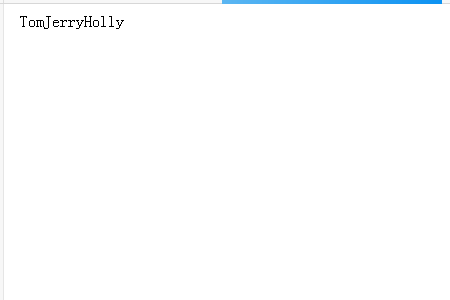
In this way, you can see The elements with indexes 0,1,2 are being accessed and output one by one.
Let’s take a look at the last jump statements: break and continue
Jump statements are used when interrupting the current process and transferring to another canonical process syntax.
It is mainly used for loop processes and can be used for for and while statements.
break statement-immediately terminate the loop process
continue statement-interrupt the executing loop process and continue the next loop process
The following uses the for statement to explain break and continue.
<script>
for (var i = 0; i < 10; i++) {
document.write (i * 10);
}
</script>break statement
In the break statement, the loop process exits when i reaches 5 and will no longer be executed.
<script>
for (var i = 0; i < 10; i++) {
if (i == 5) {
break;
}
document.write (i * 10);
}
</script>Since it is only executed until i is 4, the process terminates at 40.
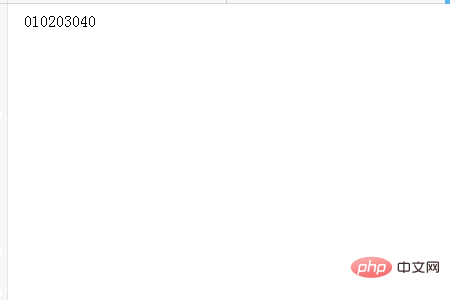
continue statement
On the other hand, when continue is executed, it is skipped only if i is 5 The loop continues to execute.
<script>
for (var i = 0; i < 10; i++) {
if (i == 5) {
continue;
}
document.write (i * 10);
}
</script>The running results are as follows
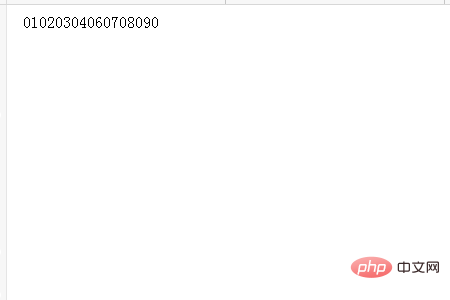
The above is the detailed content of How to use the for loop statement in JavaScript. For more information, please follow other related articles on the PHP Chinese website!

Hot AI Tools

Undresser.AI Undress
AI-powered app for creating realistic nude photos

AI Clothes Remover
Online AI tool for removing clothes from photos.

Undress AI Tool
Undress images for free

Clothoff.io
AI clothes remover

Video Face Swap
Swap faces in any video effortlessly with our completely free AI face swap tool!

Hot Article

Hot Tools

Notepad++7.3.1
Easy-to-use and free code editor

SublimeText3 Chinese version
Chinese version, very easy to use

Zend Studio 13.0.1
Powerful PHP integrated development environment

Dreamweaver CS6
Visual web development tools

SublimeText3 Mac version
God-level code editing software (SublimeText3)

Hot Topics
 How to use php to find odd numbers within 100
Dec 23, 2022 pm 06:54 PM
How to use php to find odd numbers within 100
Dec 23, 2022 pm 06:54 PM
Implementation steps: 1. Use the for statement control range to traverse the numbers from 1 to 100, the syntax is "for ($i = 1; $i <= 100; $i++) {loop body code}"; 2. In the loop body, Just use the if statement and the "%" operator to obtain and output odd numbers. The syntax is "if($i % 2 != 0){echo $i." ";}".
 What is the execution order of for loop in PHP
Sep 22, 2021 pm 06:24 PM
What is the execution order of for loop in PHP
Sep 22, 2021 pm 06:24 PM
Execution sequence: 1. Execute the "initialization expression"; 2. Execute the "conditional judgment expression". If the value of the expression is true, execute the "loop body", otherwise the loop ends; 3. After executing the loop body, execute "Variable update expression"; 4. After the variable is updated, enter the next loop until the condition judgment value is false, ending the loop.
 Does mysql have a for loop?
Mar 30, 2023 pm 08:26 PM
Does mysql have a for loop?
Mar 30, 2023 pm 08:26 PM
MySQL does not have a for loop. MySQL does not support for loop statements. It only supports three loop statements: WHILE, REPEAT and LOOP. MySQL provides loop statements, allowing you to repeatedly execute a SQL code block based on conditions.
 How to use for loop in Python
Oct 25, 2023 pm 12:18 PM
How to use for loop in Python
Oct 25, 2023 pm 12:18 PM
How to use the for loop in Python Python is a simple and easy-to-use programming language, and the for loop is one of the most commonly used tools. By using for loops, we can loop through a series of data, perform effective processing and operations, and improve the efficiency of the code. Below, I will introduce how to use the for loop in Python through specific code examples. Basic for loop syntax In Python, the syntax of a for loop is as follows: for variable in iterable object:
 JS loop learning: use of for loop statements (detailed examples)
Aug 03, 2022 pm 06:45 PM
JS loop learning: use of for loop statements (detailed examples)
Aug 03, 2022 pm 06:45 PM
In the previous article "JS Loop Learning: The Use of While Loop Statements (Detailed Examples)", we briefly learned about the while loop and the do while loop, and today we will introduce another kind of loop-the for loop statement. I hope it will be useful to everyone. Helped!
 How to separate even and odd numbers in an array using for loop in C language?
Aug 25, 2023 pm 03:09 PM
How to separate even and odd numbers in an array using for loop in C language?
Aug 25, 2023 pm 03:09 PM
An array is a group of related data items stored under a single name. For example intStudent[30];//student is an array name, a collection of 30 data items containing a single variable name Operational search of array - used to find whether a specific element exists sorting - it helps to arrange the elements in the array in ascending order or descending sort. Traversal - It processes each element in the array sequentially. Insertion - It helps to insert elements in array. Delete - It helps in deleting elements from an array. elements in the array. The logic of finding even numbers in an array is as follows - for(i=0;i<size;i++){ if(a[i]%2==0){
 Handling large arrays in Go: use for range or for loop?
Jul 24, 2023 pm 02:47 PM
Handling large arrays in Go: use for range or for loop?
Jul 24, 2023 pm 02:47 PM
We know that Go’s syntax is relatively concise. It does not provide loop control syntax such as while, do...while, etc. supported by C, but only retains one statement, the for loop.
 How to use for loop to implement flip operation in Go language
Mar 24, 2024 pm 02:15 PM
How to use for loop to implement flip operation in Go language
Mar 24, 2024 pm 02:15 PM
Title: How to use for loops to implement flip operations in Go language. In Go language, you can easily flip data structures such as arrays and slices by using for loops. In this article, we will introduce how to use for loops to flip arrays and slices, and give specific code examples. Operation of flipping an array First, let's look at how to flip an array through a for loop. We define an array containing integer elements and flip it using a for loop. packagemain






